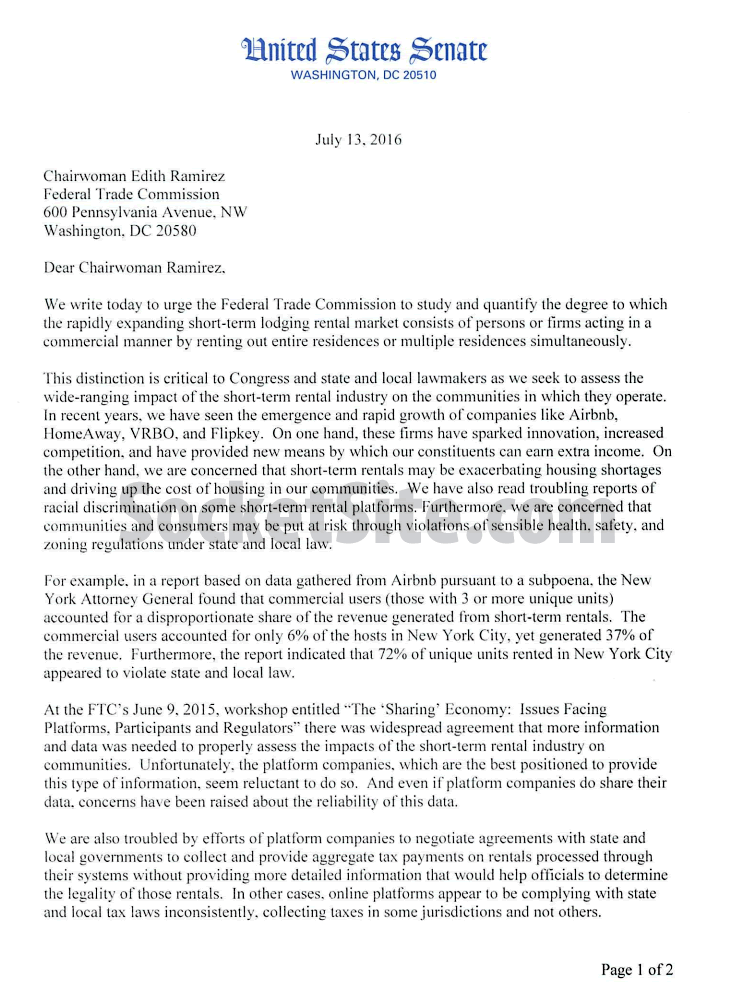Concerned that short-term rentals “may be exacerbating housing shortages and driving up the cost of housing in [their] communities,” U.S. Senators Dianne Feinstein (California), Elizabeth Warren (Massachusetts) and Brian Schatz (Hawaii) are urging the Federal Trade Commission to launch a formal investigation into the commercial use of short-term rental platforms such as Airbnb, HomeAway, and VRBO.
From yesterday’s letter to Edith Ramirez, the Chairwoman of the FTC:
“We write today to urge the Federal Trade Commission to study and quantify the degree to which the rapidly expanding short-term lodging rental market consists of persons or firms acting in a commercial manner by renting out entire residences or multiple residences simultaneously.
This distinction is critical to Congress and state and local lawmakers as we seek to assess the wide-ranging impact of the short-term rental industry on the communities in which they operate. In recent years, we have seen the emergence and rapid growth of companies like Airbnb, HomeAway, VRBO, and Flipkey. On one hand, these firms have sparked innovation, increased competition, and have provided new means by which our constituents can earn extra income. On the other hand, we are concerned that short-term rentals may be exacerbating housing shortages and driving up the cost of housing in our communities. We have also read troubling reports of racial discrimination on some short-term rental platforms. Furthermore, we are concerned that communities and consumers may be put at risk through violations of sensible health, safety, and zoning regulations under state and local law.”
While in agreement that more information and data is needed to properly assess the impacts of the short-term rental industry on communities, the Senators note that “the platform companies, which are the best positioned to provide this type of information, seem reluctant to do so.” And as such, they’re now urging the FTC to act.
In related short-term rental news, San Francisco Supervisor David Campos has been working with City Attorney Dennis Herrera’s office to draft a number of amendments to San Francisco’s recently adopted short-term rental legislation which has been challenged by Airbnb, in order to both address Airbnb’s stated objections “and fulfill the intent of a fair, enforceable ordinance.”



Maybe they should instead be looking into rent control as the cause for an imbalance in the rental market. You know, like most economists and scholars agree causes rents to go up.
“..most economists…”
Appeal to disgraced authority. Congratulations, you’ve invented a new logical fallacy!
An ad hominen argument. Congratulations.
Disgraced by whom? Armchair critics, keyboard warriors, and op-ed sensationalist articles?
The consensus among economists that rent control policies reduce the quality and quantity of housing, and increase the rents on uncontrolled units. I don’t know who you think is disgraced unless you think the Nobel Prize is a mark of shame…
Paris has just implemented a rent ceiling system. I am restructuring 2 of my apartments there. I told my contractor I will look for durability and not luxury, because I can’t get any of that money back, ever.
Are you saying that economists are disgraced and that we shouldn’t listen to their opinions on the subject matter they study their entire lives?
This is akin to climate change denial. “Well, why listen to what the SCIENTISTS have to say about this matter”.
Yep. Might as well stop listening to doctors as well, they aren’t infallible after all.
“Well Jenny McCarthy says vaccines cause autism, so let’s ignore what doctors say”.
Airbnb affects interstate commerce. You want the federal government to regulate local housing price ceilings that have already been found constitutional?
Rent control may cause rents to go up, but it also prevents massive social disruption in cities with highly constrained growth ability and frequent speculative bubbles. I would agree that our local rent control is too stringent however, and there is a happier medium out there.
I would not disagree that it is important to have, but it should be a system based on means-testing. Otherwise you have a massive disparity between entrenched renters (who may be of means) and those who are looking to get into a new unit. The irony is that it also burdens existing tenants who are under rent control. Because the market rents have out-paced their existing rent, their mobility to move into another unit is severely limited.
This. My wife and I are moving within SF and out of our rent controlled place in the Marina. Our new rent is more than double our rent controlled rent, and we can pay the new rent easily…the old rent was outrageously low based on what we could pay. My wife got into it with her sorority sisters right out of college, stayed in it forever, and then when we got married we moved in. We now collectively make around $300K per year, yet our rent was only $2400 or so. If you follow the “third of gross income on rent rule”, $2400 should be rent for a couple making only $86,400 a year. That rule (which we find aggressive, to be honest, we’d rather save more and spend more on experiences) would suggest that we were paying less than a third of what we can afford.
While it was nice to have, we can afford more and needed a better location/size/condition for where our life is now. But realistically we were stealing it for years.
The problem with SF rent control is that many people benefit from it who really don’t NEED to benefit from it. Means testing is imperative.
Thank you JWS, you are spot on in your assessment.
we paid $2150 for a 2bd 2ba in prime pac hts until 2010, when we finally outgrew it. made also about 300K together at that time. we bought a 3bd condo in early 2012 and now pay $3K in mortgage. feel very lucky
“But realistically we were stealing it for years.
The problem with SF rent control is that many people benefit from it who really don’t NEED to benefit from it.”
THANK YOU for speaking the truth.
If no rent control, the market price of all those rent controlled buildings would go up. This would increase the rent that the new buyer would need to charge for his investment to play out. So in the end, rents are still up?
Hypothetical scenario.
You have 100 units, and 100 people who would like to live in them but do not (the current tenant pool), and 100 people currently living in them (so, 200 people total). For ease of numbers, let’s assume that the 200 prospective people are grouped in groups of 20…20 can pay $1, 20 can pay $2, 20 can pay $3, all the way up to $10.
We are also going to assume that 10 people leave the market every year, with 10 people to replace them.
As 10 people leave their units (remember, there were 100 total) that frees up 10 spots. The other 90 rents and the 100 prospective tenants now have to fight for those 10 spots. Following basic rules of economics, the top 10% of the prospective tenants can move. So, the tenants who can pay $10 get to move into those units. Most prospective tenants, therefore, cannot get a spot, and most existing tenants cannot move either…they are “stuck” in their current unit, because they can only afford in the $1-$9 range.
Suppose there was a giant upset, rent control was abolished, and all property owners could raise the rents. There would be massive misery and upheaval, as every property owner raised their rents to $10. However, now you have 200 prospective tenants (the 100 prospective and 100 current, rent-controlled tenants) going for those 100 units. Remember, only 10% can afford $10. Thus, the new rent would eventually settle at what the top 50% can pay, which in our scenario is $6.
Now, I am not cold. I don’t want to see the massive upheaval it would take to reach this goal. It would be devastating and chaotic. But by simple laws, it would reduce rent significantly, yes. It would also disperse former residents, and about half could not return. But it would also allow new residents who could not afford the area to move.
This is why economists think rent control is bad policy, in a simplified nutshell. However, I think a less drastic approach (means control and/or phasing out of rent control going forward, so those who have it could keep it, or at least keep it for “X” years) is probably a smoother way to go, even if it did not reduce rents as much.
But let’s say we abolish rent control not all at once, but as each building is sold to a new owner. Or by lottery. Or something like that. Now do you think that would lower rents or actually raise them?
The poor move into an inner city and chase the well-off residents away: not a problem
The rich move into an inner city and chase the poorer residents away: pitchforks
Maybe people who want to own and opperate hotels should buy hotels.
Rent control solves everything. **rolls eyes**
There is NO ONE to police rent control. It gets passed from one renter to the next w/o the knowledge of the landlord(s). I know some of these people make incomes of $100K+. As I’ve said before, I know some of the people, and the BRAG about how they’re in a rent-controlled unit and make so . . . much . . . money. Disgusting.
It gets passed from one renter to the next w/o the knowledge of the landlord(s).
Hold on a minute, there. Once the last person named on a lease for a rent-controlled unit moves out (and stops signing the rent checks), the landlord can raise the rent.
I don’t know how they do it (I don’t ask them). Like I said, I know some of these people.
To be sure, they *can* raise the rent. If the landlord signed a new lease with the new/remaining tenants at the old rent, that’s not rent control and it’s on the landlord. Higher rent doesn’t just happen automatically.
Maybe they should imprison people who break the law.
Me thinks the hospitality industry is feeling the pain now…I wonder how much they have contributed to the pols to look into this issue? Am I being cynical??
I am certain that they are seeing effects, but probably not as much as one would think. I’d argue that they are still booked solid in most seasons. Not to mention we have additional hotels being built (in FiDi, SOMA). To me this looks like politicians trying to make themselves look useful.
yeah, based on my recent travel experiences (Hawaii, Boston, NYC) hotels have very high occupancies and are still able to charge startlingly high rates, so I don’t think they’re feeling AirBNB pain.
To me this is politicians doing their job, and I, for one, am thankful for it.
Me too.
Home sharing makes units slightly more valuable, but seems like it would affect only a small number of units. Compare that to the massive effect of lower interest rates and 3% down mortgages and it seems ridiculous to single out home sharing.
The real problem with home sharing is externalities forced upon neighbors and neighborhoods.
Wait until a someone renting on airbnb or other site has a guest that causes a fire and then burns down neighboring houses. Who is liable? Its scenarios like this, among other things, why we have legislation, whether people like it or not. If you choose to run your business based on a model that will run into legislative problems, well thats just dumb. Doesnt san francisco have an existing law that requires bed and breakfasts to register? Why would those listed on these platforms not fall under this category?
That is why god created lawyers and insurance brokers.
I would rather not have to deal with lawyers and insurance brokers, thankyouverymuch. I would rather my neighbors follow the law for the peace and safety of the neighborhood.
Many of us feel the same, yet here we are.
No different than a tenant causing a fire or an old building with deferred maintenance catching fire (see: Mission fire). Airbnb provides an insurance policy to the owner of the rental and I am sure that the next door neighbor’s property insurance will cover the damage.
Pulled from 2015 statistics: there were over 500,000 people staying in Airbnb units per night. How many properties have caught fire?
It’s absolutely different when you are running an illegal business in your house and you may go after the person staying there to be liable. But not living next to hotels is also why many people choose to buy their homes where they do. Whatever, i’m bored with the arguments for airbnb etc. They are illegal and went into business with a tenous business model and now are fighting legality that most businesses comply with before comng to market. Bottom line is you don’t get to do whatever you want with your house and you shouldnt start a business assuming this will be the case. Their obnoxious attitude doesn’t help them. Looking forward to their demise.
Just out of curiosity, would you ever know if your next door neighbor had an Airbnb unit? Odds are there are countless hosts in your vicinity, but you likely aren’t even aware of it.
In cases where the unit is on Airbnb only occasionally and the guests act in a civilized manner, no, you likely would never notice. Same way you likely never notice your neighbors’ occasional house guests. But there are many cases of units that are full-time Airbnb, filled with tourists who are on vacation and thus staying up late, making noise, etc night after night. That’s where the problem lies.
I agree and think the solution is simple: give neighbors more power. If a host gets too many complaints of noise from neighbors, then Airbnb either suspends their account, or the city can fine them. And then let the host go after the offending guest- Airbnb has their credit card- they can keep a nuisance deposit, etc. That will motivate hosts and guests to behave. An arrangement of that nature will help what bothers most people in practical terms, and allows property owners to rent short term. Non of this SF nonsense of trying to sue Airbnb, etc.
Airbnb sued SF, not the other way around.
On the broader point, Airbnb has zero incentive to ever discipline any host who has offending guests (and a huge disincentive as it would anger its money machines, er, I mean hosts), so relying on that would not be effective.
Yeah I meant this nonsense about forcing Airbnb to be responsible fiscally for the hosts actions (and why they sued.)
As for your second point, I disagree. Airbnb would much prefer to reduce their controversy. And having rules that both hosts and guests must abide by, or get called out by neighbors, will help them make money in the long run. They can ban reuse guests, and the occasional host who doesn’t care (most do.) the goodwill generate would more than offset a small amount of cancelled future bookings.
But they don’t really want to make money in the long run. Management and the VC’s want to show hyper-growth, cash out and then it’s all someone else’s problem.
You might conclude that the neighbors are Air BNB-ing their place when you see many people with suitcases waiting outside the building, and you hear many loud parties in the neighbor’s back yard.
Blah blah blah. the number of units for rent being so low in sf is one way i am aware of it. There are countless people aware of units being rented in their neighborhood. I wouldnt want to buy a house and have my neighbors start running an illegal hotel after i have moved in. I also might not be aware that my neighbor is running a brothel or an unlicensed restaurant but that doesnt mean it should be permitted now does it?
Another enormously popular and successful idea heads for the government buzzsaw. If the regulatory system these overlords created is so wonderful, why is there such hunger for alternatives? I hazard to guess that there are many more satisfied hosts and guests than embittered detractors.
This is complete BS. Where are these pols on increasing the housing supply?
All the big hotel and real estate lobbiests calling in their donation chips… Of course they don’t like free market AirBnB and are trying to get their political establishment buddies to bully Airbnb – sad. Go Trump!
Yay, Trump. Striking fear into the hearts of hotel and real estate lobbyists everywhere!
This is just cheap posturing. This issue isn’t going to get serious federal attention. FFS this isn’t even a state level issue, but a local one. Hence SF [Board of Supervisors] biting-angry-dog reaction. Glad Airbnb is fighting them back.
Trouble is that the sheeple fall for this stuff all the time.
What’s Pelosi’s position on Pokemon Go clowns? They’ve ruined the Beach Chalet among other places. Can we get a ballot proposition here?
As long as the good senators are stewarding public resources with care, there should be no reason why they should not get involved in this important issue.
Love how supply and demand applies when it comes to short term rental and taking units off the market drives up rent. But when we talk about adding supply to meet demand, supply and demand does not apply to SF.
Painful
“Furthermore, we are concerned that communities and consumers may be put at risk through violations of sensible health, safety, and zoning regulations under state and local law.”
Agreed.